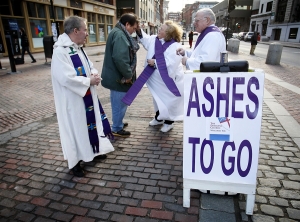Texts: Isaiah 58:1-12 + Psalm 51:1-17 + 2 Corinthians 5:20b-6:10 + Matthew 6:1-6,16-21
The prophet Isaiah issues a call to action, “Shout out, do not hold back! Lift up your voice like a trumpet!” (Isa. 58:1) and Jesus in the Gospel of Matthew replies, “So, whenever you give alms, do not sound a trumpet before you, as the hypocrites do in the synagogues and in the streets, so they may be praised by others” (Mt. 6:2).  At El stops across the city, people have been getting their ashes-to-go since this morning’s commute, even as Jesus continues with “And whenever you pray, do not be like the hypocrites; for they love to stand and pray in the synagogues and at the street corners, so that they may be seen by others” (Mt. 6:5) And, it is almost guaranteed that if you leave worship tonight with the sign of the cross on your forehead and venture into any public place, someone will ask you, “what have you given up for Lent?” How will you answer, given that Jesus instructs, “whenever you fast, do not look dismal, like the hypocrites, for they disfigure their faces so as to show others that they are fasting. Truly I tell you, they have received their reward” (Mt. 6:16)
At El stops across the city, people have been getting their ashes-to-go since this morning’s commute, even as Jesus continues with “And whenever you pray, do not be like the hypocrites; for they love to stand and pray in the synagogues and at the street corners, so that they may be seen by others” (Mt. 6:5) And, it is almost guaranteed that if you leave worship tonight with the sign of the cross on your forehead and venture into any public place, someone will ask you, “what have you given up for Lent?” How will you answer, given that Jesus instructs, “whenever you fast, do not look dismal, like the hypocrites, for they disfigure their faces so as to show others that they are fasting. Truly I tell you, they have received their reward” (Mt. 6:16)
What’s a faithful Christian to do with this season of Lent?
Though they may disagree on the surface about the nature of our repentance, whether it should be public or private, the prophet Isaiah and Jesus share in common a distaste for the hypocrisy that fills too much religious ritual. When Isaiah instructs his listeners to lift up their voices like trumpets, it is not so that the world can see their faith, but so that the community can hear as an honest account of their failings is made public.
Isaiah mocks the pleas of the people as he mimics their complaints, “why do we fast, but you do not see? Why humble ourselves, but you do not notice?” (Isa. 58:3a) In response he offers a cold dose of hard truth, “Look, you serve your own interest on your fast day, and oppress all your workers” (Isa. 58:3b). The prophet has sounded the horns not to praise the people, but to take a searching and fearless moral inventory of their wrongdoings.
 If that language of “searching and fearless moral inventory” sounds familiar to you, then you’re probably acquainted with the 12 steps and 12 traditions of Alcoholics Anonymous, or one of the many communities of recovery based on the 12-step spirituality that emerged from AA. The steps are an essential part of the process of healing that restores people to life and makes it possible for them to return to the families and communities they have harmed in a new way. Listen to the twelve steps:
If that language of “searching and fearless moral inventory” sounds familiar to you, then you’re probably acquainted with the 12 steps and 12 traditions of Alcoholics Anonymous, or one of the many communities of recovery based on the 12-step spirituality that emerged from AA. The steps are an essential part of the process of healing that restores people to life and makes it possible for them to return to the families and communities they have harmed in a new way. Listen to the twelve steps:
We admitted that we were powerless … that our lives had become unmanageable.
Came to believe that a power greater than ourselves could restore us to sanity.
Made a decision to turn our will and our lives over to the care of God, as we understood God.
Made a searching and fearless moral inventory of ourselves.
Admitted to God, to ourselves, and to another human being the exact nature of our wrongs.
Were entirely ready to have God remove all these defects of character.
Humbly asked God to remove our shortcomings.
Made a list of all persons we had harmed, and became willing to make amends to them all.
Made direct amends to such people wherever possible, except when to do so would injure them or others.
Continued to take personal inventory, and when we were wrong, promptly admitted it.
Sought through prayer and meditation to improve our conscious contact with God as we understood God, praying only for God’s will for us and the power to carry that out.
Having had a spiritual awakening as the result of these steps, we tried to carry this message to [others who shared our condition], and to practice these principles in all our affairs.
Taken as a whole, the 12 steps set out by communities of recovery like Alcoholic Anonymous give us, perhaps, contemporary language for making sense of the ancient traditions of Ash Wednesday.
We are addicts, all of us. Some of our addictions are confined to our own personal behavior — be that drinking or drugs, gambling or sex. Some of our addictions, though, are harder to spot because we share them with so many of the people around us — a reliance on violence, in any of its many forms, to establish and maintain control; a dependency on wealth to prop up a flagging sense of self; a habit we just can’t shake of taking on more and more work to prove to ourselves and others just how important we are. Then there are those mass addictions, our unhealthy attachment to goods and services that come to us at great expense to others: foreign oil, sweatshop clothing, cheap food, and the list goes on. We allow ourselves to remember only briefly and occasionally the cost others pay daily so that we can get our quick fix of consumer culture and conspicuous consumption.
In 12-step recovery programs, the promise that’s held out is that there is restored health and new life available to all, but that to get there we will have to be honest with ourselves, with others, and with God. The same is true tonight, on Ash Wednesday, as we begin a season of repentance and renewal that will last forty days, and will culminate in our celebration of the resurrected life that is ours through Christ Jesus when we finally arrive at Easter on the other side of this season.
But that is still forty days off, and the new life that God is always giving us comes to us all, rich and poor, one day at a time. There will be many steps between this night and that great morning, but none of us can speed the days or avoid the work to be done in the interim. “Now is the acceptable time; see now is the day of salvation!” (2 Cor. 6:2b)
Tonight’s work is to take a searching and fearless inventory of our failures as individuals and as a people — not in order to generate a certain mood, or the appearance of penitence — but so that we can actually open our hearts and our lives to the healing that God is always and already pouring into and over us.
As we do our work we will be marked with ashes, not so that the world around us might notice what good Christians we are, but so that we might remember that life is short, and precious, and sooner than we can imagine will be over. And why would we want to spend one more minute of our irreplaceable lives pretending to be well, when God is already at work making us truly whole.
Amen.